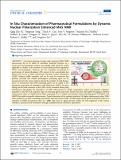In Situ Characterization of Pharmaceutical Formulations by Dynamic Nuclear Polarization Enhanced MAS NMR
Author(s)
Ni, Qing Zhe; Yang, Fengyuan; Can, Thach V.; Sergeyev, Ivan V.; D’Addio, Suzanne M.; Jawla, Sudheer K.; Li, Yongjun; Lipert, Maya P.; Xu, Wei; Williamson, R. Thomas; Leone, Anthony; Griffin, Robert G.; Su, Yongchao; ... Show more Show less
DownloadPharmaceutics, DNP MAS NMR (3.877Mb)
PUBLISHER_POLICY
Publisher Policy
Article is made available in accordance with the publisher's policy and may be subject to US copyright law. Please refer to the publisher's site for terms of use.
Terms of use
Metadata
Show full item recordAbstract
A principal advantage of magic angle spinning (MAS) NMR spectroscopy lies in its ability to determine molecular structure in a noninvasive and quantitative manner. Accordingly, MAS should be widely applicable to studies of the structure of active pharmaceutical ingredients (API) and formulations. However, the low sensitivity encountered in spectroscopy of natural abundance APIs present at low concentration has limited the success of MAS experiments. Dynamic nuclear polarization (DNP) enhances NMR sensitivity and can be used to circumvent this problem provided that suitable paramagnetic polarizing agent can be incorporated into the system without altering the integrity of solid dosages. Here, we demonstrate that DNP polarizing agents can be added in situ during the preparation of amorphous solid dispersions (ASDs) via spray drying and hot-melt extrusion so that ASDs can be examined during drug development. Specifically, the dependence of DNP enhancement on sample composition, radical concentration, relaxation properties of the API and excipients, types of polarizing agents and proton density, has been thoroughly investigated. Optimal enhancement values are obtained from ASDs containing 1% w/w radical concentration. Both polarizing agents TOTAPOL and AMUPol provided reasonable enhancements. Partial deuteration of the excipient produced 3× higher enhancement values. With these parameters, an ASD containing posaconazole and vinyl acetate yields a 32-fold enhancement which presumably results in a reduction of NMR measurement time by ∼1000. This boost in signal intensity enables the full assignment of the natural abundance pharmaceutical formulation through multidimensional correlation experiments.
Date issued
2017-08Department
Massachusetts Institute of Technology. Plasma Science and Fusion CenterJournal
Journal of Physical Chemistry B
Publisher
American Chemical Society (ACS)
Citation
Ni, Qing Zhe et al. “In Situ Characterization of Pharmaceutical Formulations by Dynamic Nuclear Polarization Enhanced MAS NMR.” The Journal of Physical Chemistry B 121, 34 (August 2017): 8132–8141 © 2017 American Chemical Society
Version: Author's final manuscript
ISSN
1520-6106
1520-5207